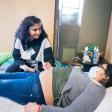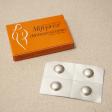More than half of women of reproductive age in India have some level of anemia because they do not have enough healthy red blood cells. Anemia can cause fatigue, lightheadedness, and dizziness, and may be improved by taking iron supplements. Efforts to reduce anemia in India have typically addressed pregnant women, yet non-pregnant women are the largest group of people with anemia. New research from Bixby member Dr. Erica Sedlander examined women’s intentions to take iron supplements to inform interventions that may increase their use.
The researchers surveyed non-pregnant women of reproductive age in Odisha, India, and measured their anemia levels. They found that 60% of women were anemic, but only 5% knew it. They found that less than 3% of women were taking iron supplements, but 75% indicated they had taken them in the past. The strongest association with an intention to take iron supplements was a belief in their ability to do so, called self-efficacy.
This study shows that, while important, shifting communities’ social norms and increasing women’s knowledge alone are not enough to change behavior. The strongest lever to reduce anemia for reproductive age women may be to improve their self-efficacy for taking iron supplements. Specific targeted efforts towards women at different stages of their reproductive life course are logical first steps to reach the World Health Assembly goal to reduce anemia by half by 2025.

